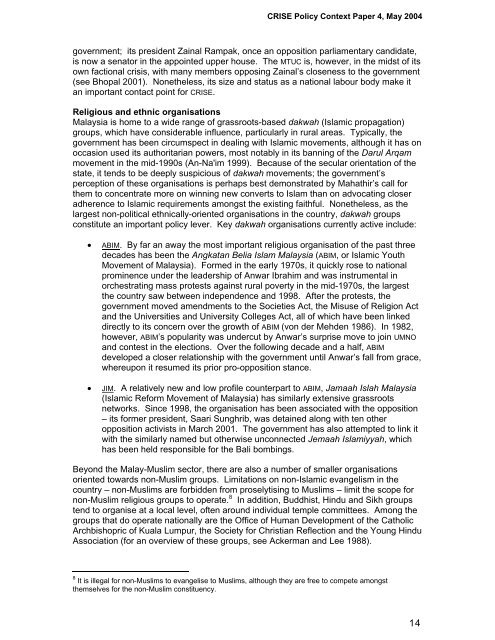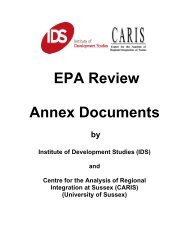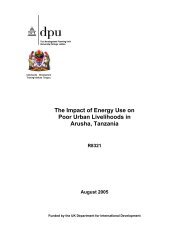Policy Levers in Malaysia - Department of International ...
Policy Levers in Malaysia - Department of International ...
Policy Levers in Malaysia - Department of International ...
You also want an ePaper? Increase the reach of your titles
YUMPU automatically turns print PDFs into web optimized ePapers that Google loves.
CRISE <strong>Policy</strong> Context Paper 4, May 2004<br />
government; its president Za<strong>in</strong>al Rampak, once an opposition parliamentary candidate,<br />
is now a senator <strong>in</strong> the appo<strong>in</strong>ted upper house. The MTUC is, however, <strong>in</strong> the midst <strong>of</strong> its<br />
own factional crisis, with many members oppos<strong>in</strong>g Za<strong>in</strong>al’s closeness to the government<br />
(see Bhopal 2001). Nonetheless, its size and status as a national labour body make it<br />
an important contact po<strong>in</strong>t for CRISE.<br />
Religious and ethnic organisations<br />
<strong>Malaysia</strong> is home to a wide range <strong>of</strong> grassroots-based dakwah (Islamic propagation)<br />
groups, which have considerable <strong>in</strong>fluence, particularly <strong>in</strong> rural areas. Typically, the<br />
government has been circumspect <strong>in</strong> deal<strong>in</strong>g with Islamic movements, although it has on<br />
occasion used its authoritarian powers, most notably <strong>in</strong> its bann<strong>in</strong>g <strong>of</strong> the Darul Arqam<br />
movement <strong>in</strong> the mid-1990s (An-Na'im 1999). Because <strong>of</strong> the secular orientation <strong>of</strong> the<br />
state, it tends to be deeply suspicious <strong>of</strong> dakwah movements; the government’s<br />
perception <strong>of</strong> these organisations is perhaps best demonstrated by Mahathir’s call for<br />
them to concentrate more on w<strong>in</strong>n<strong>in</strong>g new converts to Islam than on advocat<strong>in</strong>g closer<br />
adherence to Islamic requirements amongst the exist<strong>in</strong>g faithful. Nonetheless, as the<br />
largest non-political ethnically-oriented organisations <strong>in</strong> the country, dakwah groups<br />
constitute an important policy lever. Key dakwah organisations currently active <strong>in</strong>clude:<br />
• UABIMU. By far an away the most important religious organisation <strong>of</strong> the past three<br />
decades has been the Angkatan Belia Islam <strong>Malaysia</strong> (ABIM, or Islamic Youth<br />
Movement <strong>of</strong> <strong>Malaysia</strong>). Formed <strong>in</strong> the early 1970s, it quickly rose to national<br />
prom<strong>in</strong>ence under the leadership <strong>of</strong> Anwar Ibrahim and was <strong>in</strong>strumental <strong>in</strong><br />
orchestrat<strong>in</strong>g mass protests aga<strong>in</strong>st rural poverty <strong>in</strong> the mid-1970s, the largest<br />
the country saw between <strong>in</strong>dependence and 1998. After the protests, the<br />
government moved amendments to the Societies Act, the Misuse <strong>of</strong> Religion Act<br />
and the Universities and University Colleges Act, all <strong>of</strong> which have been l<strong>in</strong>ked<br />
directly to its concern over the growth <strong>of</strong> ABIM (von der Mehden 1986). In 1982,<br />
however, ABIM’s popularity was undercut by Anwar’s surprise move to jo<strong>in</strong> UMNO<br />
and contest <strong>in</strong> the elections. Over the follow<strong>in</strong>g decade and a half, ABIM<br />
developed a closer relationship with the government until Anwar’s fall from grace,<br />
whereupon it resumed its prior pro-opposition stance.<br />
• UJIMU. A relatively new and low pr<strong>of</strong>ile counterpart to ABIM, Jamaah Islah <strong>Malaysia</strong><br />
(Islamic Reform Movement <strong>of</strong> <strong>Malaysia</strong>) has similarly extensive grassroots<br />
networks. S<strong>in</strong>ce 1998, the organisation has been associated with the opposition<br />
– its former president, Saari Sunghrib, was deta<strong>in</strong>ed along with ten other<br />
opposition activists <strong>in</strong> March 2001. The government has also attempted to l<strong>in</strong>k it<br />
with the similarly named but otherwise unconnected Jemaah Islamiyyah, which<br />
has been held responsible for the Bali bomb<strong>in</strong>gs.<br />
Beyond the Malay-Muslim sector, there are also a number <strong>of</strong> smaller organisations<br />
oriented towards non-Muslim groups. Limitations on non-Islamic evangelism <strong>in</strong> the<br />
country – non-Muslims are forbidden from proselytis<strong>in</strong>g to Muslims – limit the scope for<br />
8<br />
non-Muslim religious groups to operate.TP PT In addition, Buddhist, H<strong>in</strong>du and Sikh groups<br />
tend to organise at a local level, <strong>of</strong>ten around <strong>in</strong>dividual temple committees. Among the<br />
groups that do operate nationally are the Office <strong>of</strong> Human Development <strong>of</strong> the Catholic<br />
Archbishopric <strong>of</strong> Kuala Lumpur, the Society for Christian Reflection and the Young H<strong>in</strong>du<br />
Association (for an overview <strong>of</strong> these groups, see Ackerman and Lee 1988).<br />
8<br />
TP PT It is illegal for non-Muslims to evangelise to Muslims, although they are free to compete amongst<br />
themselves for the non-Muslim constituency.<br />
14
















